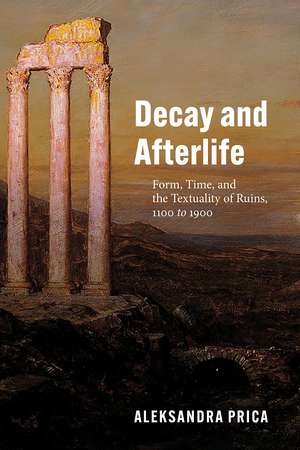Decay and Afterlife: Form, Time, and the Textuality of Ruins, 1100 to 1900
Autor Professor Aleksandra Pricaen Limba Engleză Paperback – 17 feb 2022
Western ruins have long been understood as objects riddled with temporal contradictions, whether they appear in baroque poetry and drama, Romanticism’s nostalgic view of history, eighteenth-century paintings of classical subjects, or even recent photographic histories of the ruins of postindustrial Detroit. Decay and Afterlife pivots away from our immediate, visual fascination with ruins, focusing instead on the textuality of ruins in works about disintegration and survival. Combining an impressive array of literary, philosophical, and historiographical works both canonical and neglected, and encompassing Latin, Italian, French, German, and English sources, Aleksandra Prica addresses ruins as textual forms, examining them in their extraordinary geographical and temporal breadth, highlighting their variability and reflexivity, and uncovering new lines of aesthetic and intellectual affinity. Through close readings, she traverses eight hundred years of intellectual and literary history, from Seneca and Petrarch to Hegel, Goethe, and Georg Simmel. She tracks European discourses on ruins as they metamorphose over time, identifying surprising resemblances and resonances, ignored contrasts and tensions, as well as the shared apprehensions and ideas that come to light in the excavation of these discourses.
| Toate formatele și edițiile | Preț | Express |
|---|---|---|
| Paperback (1) | 238.12 lei 3-5 săpt. | +16.38 lei 6-12 zile |
| University of Chicago Press – 17 feb 2022 | 238.12 lei 3-5 săpt. | +16.38 lei 6-12 zile |
| Hardback (1) | 619.15 lei 6-8 săpt. | |
| University of Chicago Press – 25 apr 2022 | 619.15 lei 6-8 săpt. |
Preț: 238.12 lei
Nou
Puncte Express: 357
Preț estimativ în valută:
45.57€ • 47.08$ • 37.90£
45.57€ • 47.08$ • 37.90£
Carte disponibilă
Livrare economică 27 februarie-13 martie
Livrare express 12-18 februarie pentru 26.37 lei
Preluare comenzi: 021 569.72.76
Specificații
ISBN-13: 9780226811598
ISBN-10: 022681159X
Pagini: 304
Ilustrații: 8 halftones
Dimensiuni: 152 x 229 x 28 mm
Greutate: 0.43 kg
Editura: University of Chicago Press
Colecția University of Chicago Press
ISBN-10: 022681159X
Pagini: 304
Ilustrații: 8 halftones
Dimensiuni: 152 x 229 x 28 mm
Greutate: 0.43 kg
Editura: University of Chicago Press
Colecția University of Chicago Press
Notă biografică
Aleksandra Prica is associate professor of German literature at the University of North Carolina at Chapel Hill.
Cuprins
List of Figures
List of Abbreviations
Introduction
I Foundations
1 Among Ruins: Martin Heidegger and Sigmund Freud
2 Afterlife: Hans Blumenberg and Walter Benjamin
II The Propitious Moment
3 Petrarch and the View of Rome
4 Poliphilo and the Dream of Ruins
III Living On
5 Ferdinand Gregorovius, Hildebert of Lavardin, and the Rupture of Continuity
6 Lucius Annaeus Seneca, Martin Opitz, and the Overcoming of Vanity
IV The Battleground of Time
7 Johann Jacob Breitinger, Andreas Gryphius, and the Reconsideration of Allegory
8 Thomas Burnet, Georg Wilhelm Friedrich Hegel, and the Realignment of Discourses
V Futures and Ruins
9 Johann Wolfgang von Goethe, Georg Simmel, and the Provisionality of Forms
Epilogue
Acknowledgments
Bibliography
Index
List of Abbreviations
Introduction
I Foundations
1 Among Ruins: Martin Heidegger and Sigmund Freud
2 Afterlife: Hans Blumenberg and Walter Benjamin
II The Propitious Moment
3 Petrarch and the View of Rome
4 Poliphilo and the Dream of Ruins
III Living On
5 Ferdinand Gregorovius, Hildebert of Lavardin, and the Rupture of Continuity
6 Lucius Annaeus Seneca, Martin Opitz, and the Overcoming of Vanity
IV The Battleground of Time
7 Johann Jacob Breitinger, Andreas Gryphius, and the Reconsideration of Allegory
8 Thomas Burnet, Georg Wilhelm Friedrich Hegel, and the Realignment of Discourses
V Futures and Ruins
9 Johann Wolfgang von Goethe, Georg Simmel, and the Provisionality of Forms
Epilogue
Acknowledgments
Bibliography
Index
Recenzii
“Decay and Afterlife is a brilliant study that offers a veritable contribution to the library on ruins, ruination, debris, and decay. Through a series of deep readings on ruins-related texts from several European literary traditions, Prica makes a case that ruins manifest a textuality that productively troubles chronologies, histories, and meaning making. Ruins, we learn, are double-edged: they both invite and undo efforts to make sense of them.”
“Decay and Afterlife is a highly original book that combines extraordinary historical scope and textual diversity with analytical perspicacity. Prica covers the cultural, literary, and philosophical history of ruins from the high middle ages to the twentieth century, and the advantages of this impressive longitudinal perspective are apparent. Prica’s analyses of the modern theorizations of ruins and time’s passing are characterized by an uncommon historical depth, and her readings of premodern encounters are informed by theoretical sophistication.”
